Social Work Theory and Practice: Aboriginal Health Issues Analysis
VerifiedAdded on 2022/10/01
|14
|3775
|365
Report
AI Summary
This report critically examines the social work challenges and issues concerning Aboriginal health in Australia. It highlights the historical context of mistreatment, racism, and discrimination, which have fostered distrust between Aboriginal communities and the government. The report analyzes various social issues, particularly healthcare disparities, mental health concerns, and the impact of political and economic factors. It delves into critical discourses, including the importance of incorporating Nyoongar worldviews and addressing cultural and linguistic barriers in healthcare delivery. The report applies critical social work theories such as psychosocial, social cognitive, and systems theories to understand the complexities of human behavior within the Aboriginal context. It provides examples of critical social work approaches, practice strategies, and recommendations for developing social work practitioners. The report concludes by emphasizing the importance of empathy, respect, and cultural sensitivity in providing effective social work services to Aboriginal communities, advocating for the recognition of Aboriginal rights and equal opportunities to bridge the gap between them and the wider Australian society.
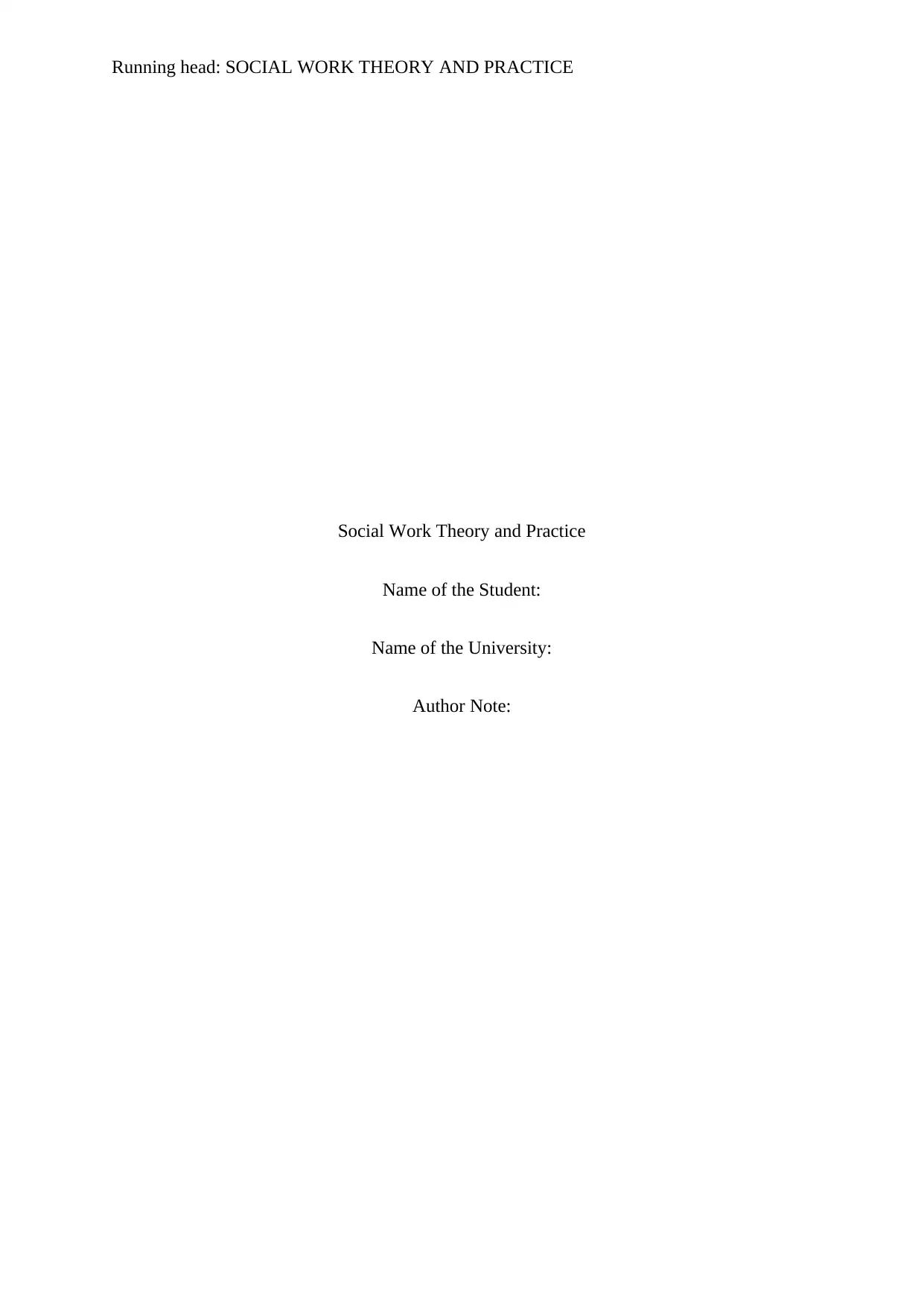
Running head: SOCIAL WORK THEORY AND PRACTICE
Social Work Theory and Practice
Name of the Student:
Name of the University:
Author Note:
Social Work Theory and Practice
Name of the Student:
Name of the University:
Author Note:
Paraphrase This Document
Need a fresh take? Get an instant paraphrase of this document with our AI Paraphraser
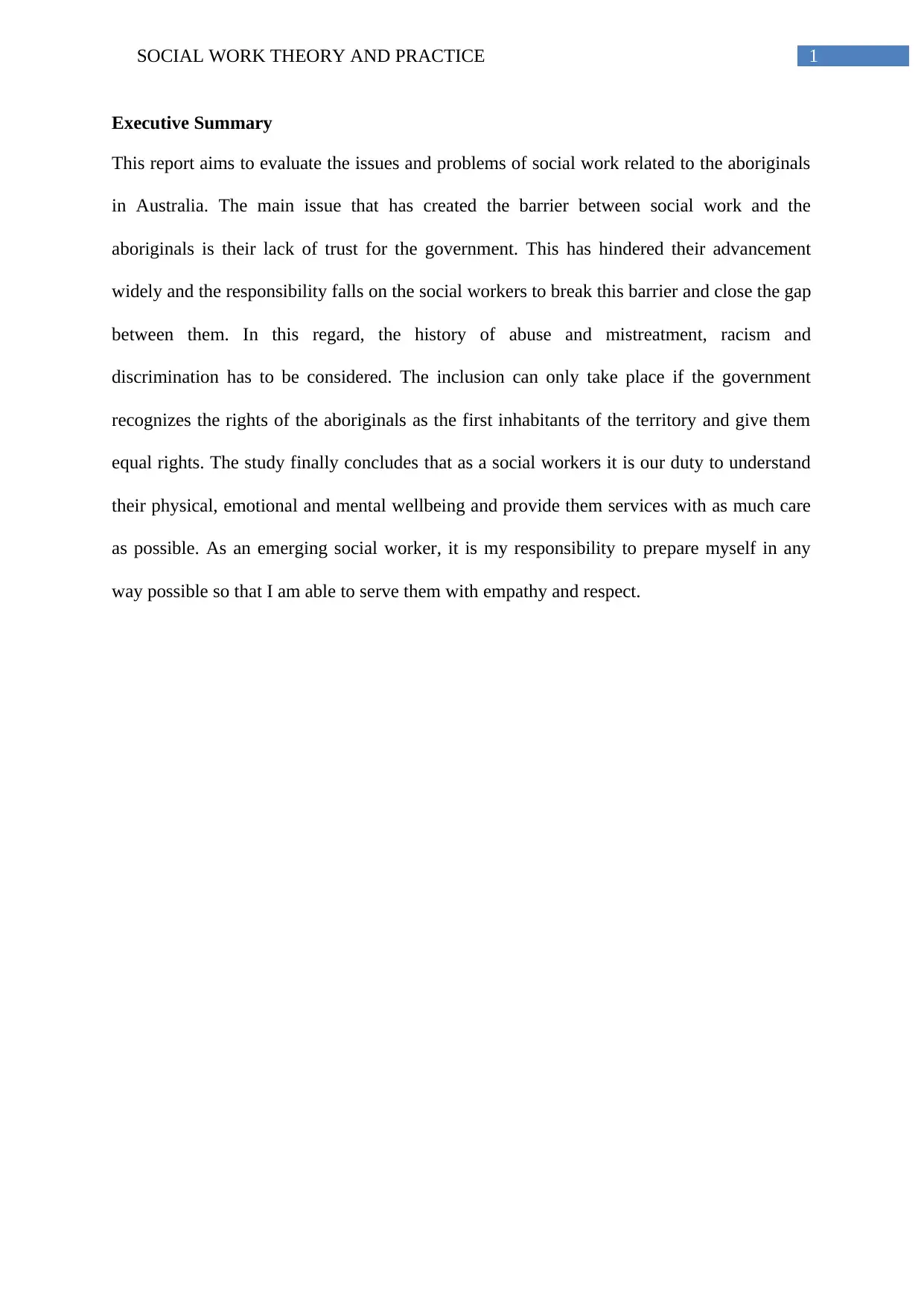
1SOCIAL WORK THEORY AND PRACTICE
Executive Summary
This report aims to evaluate the issues and problems of social work related to the aboriginals
in Australia. The main issue that has created the barrier between social work and the
aboriginals is their lack of trust for the government. This has hindered their advancement
widely and the responsibility falls on the social workers to break this barrier and close the gap
between them. In this regard, the history of abuse and mistreatment, racism and
discrimination has to be considered. The inclusion can only take place if the government
recognizes the rights of the aboriginals as the first inhabitants of the territory and give them
equal rights. The study finally concludes that as a social workers it is our duty to understand
their physical, emotional and mental wellbeing and provide them services with as much care
as possible. As an emerging social worker, it is my responsibility to prepare myself in any
way possible so that I am able to serve them with empathy and respect.
Executive Summary
This report aims to evaluate the issues and problems of social work related to the aboriginals
in Australia. The main issue that has created the barrier between social work and the
aboriginals is their lack of trust for the government. This has hindered their advancement
widely and the responsibility falls on the social workers to break this barrier and close the gap
between them. In this regard, the history of abuse and mistreatment, racism and
discrimination has to be considered. The inclusion can only take place if the government
recognizes the rights of the aboriginals as the first inhabitants of the territory and give them
equal rights. The study finally concludes that as a social workers it is our duty to understand
their physical, emotional and mental wellbeing and provide them services with as much care
as possible. As an emerging social worker, it is my responsibility to prepare myself in any
way possible so that I am able to serve them with empathy and respect.
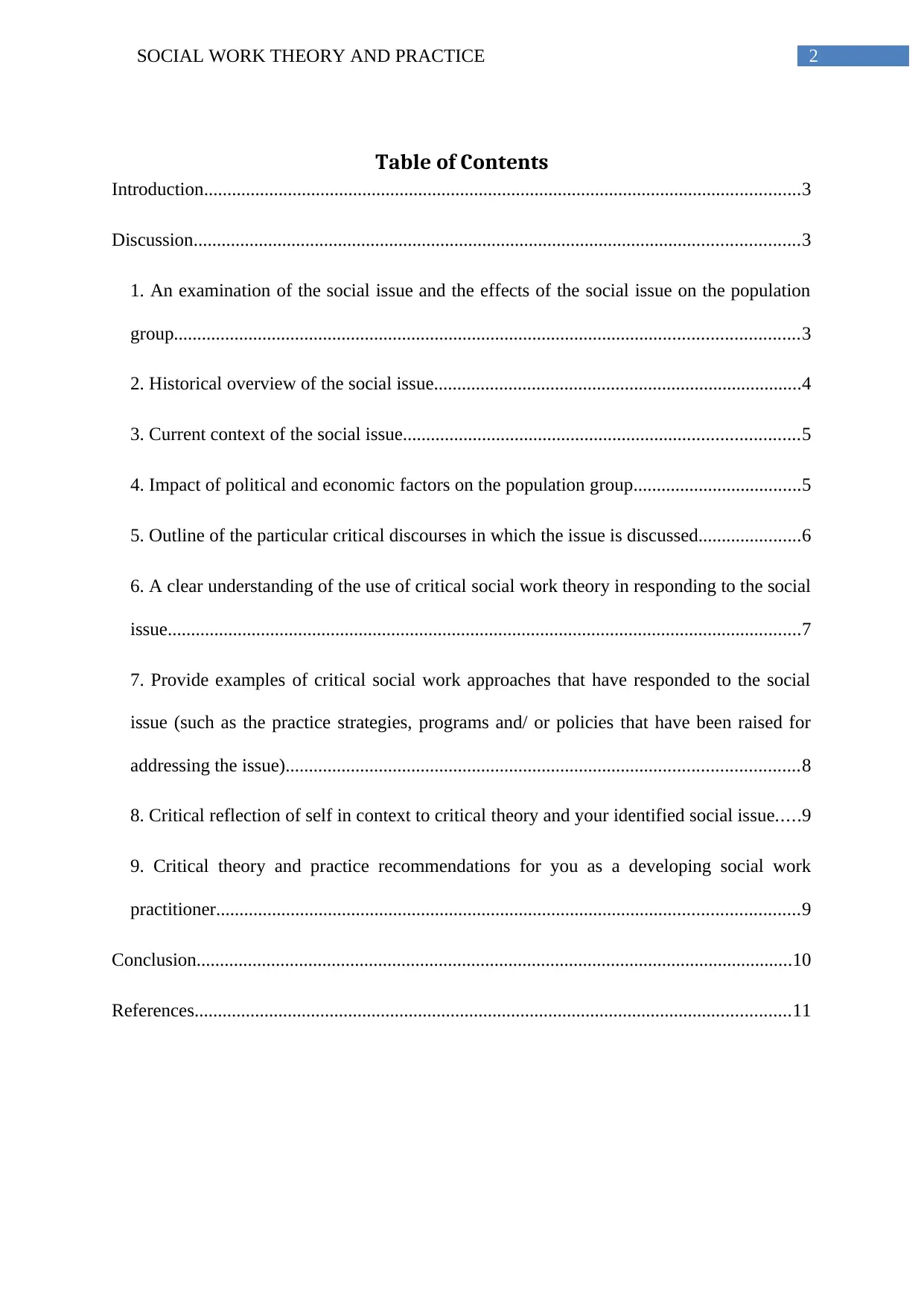
2SOCIAL WORK THEORY AND PRACTICE
Table of Contents
Introduction................................................................................................................................3
Discussion..................................................................................................................................3
1. An examination of the social issue and the effects of the social issue on the population
group......................................................................................................................................3
2. Historical overview of the social issue...............................................................................4
3. Current context of the social issue.....................................................................................5
4. Impact of political and economic factors on the population group....................................5
5. Outline of the particular critical discourses in which the issue is discussed......................6
6. A clear understanding of the use of critical social work theory in responding to the social
issue........................................................................................................................................7
7. Provide examples of critical social work approaches that have responded to the social
issue (such as the practice strategies, programs and/ or policies that have been raised for
addressing the issue)..............................................................................................................8
8. Critical reflection of self in context to critical theory and your identified social issue.....9
9. Critical theory and practice recommendations for you as a developing social work
practitioner.............................................................................................................................9
Conclusion................................................................................................................................10
References................................................................................................................................11
Table of Contents
Introduction................................................................................................................................3
Discussion..................................................................................................................................3
1. An examination of the social issue and the effects of the social issue on the population
group......................................................................................................................................3
2. Historical overview of the social issue...............................................................................4
3. Current context of the social issue.....................................................................................5
4. Impact of political and economic factors on the population group....................................5
5. Outline of the particular critical discourses in which the issue is discussed......................6
6. A clear understanding of the use of critical social work theory in responding to the social
issue........................................................................................................................................7
7. Provide examples of critical social work approaches that have responded to the social
issue (such as the practice strategies, programs and/ or policies that have been raised for
addressing the issue)..............................................................................................................8
8. Critical reflection of self in context to critical theory and your identified social issue.....9
9. Critical theory and practice recommendations for you as a developing social work
practitioner.............................................................................................................................9
Conclusion................................................................................................................................10
References................................................................................................................................11
⊘ This is a preview!⊘
Do you want full access?
Subscribe today to unlock all pages.

Trusted by 1+ million students worldwide
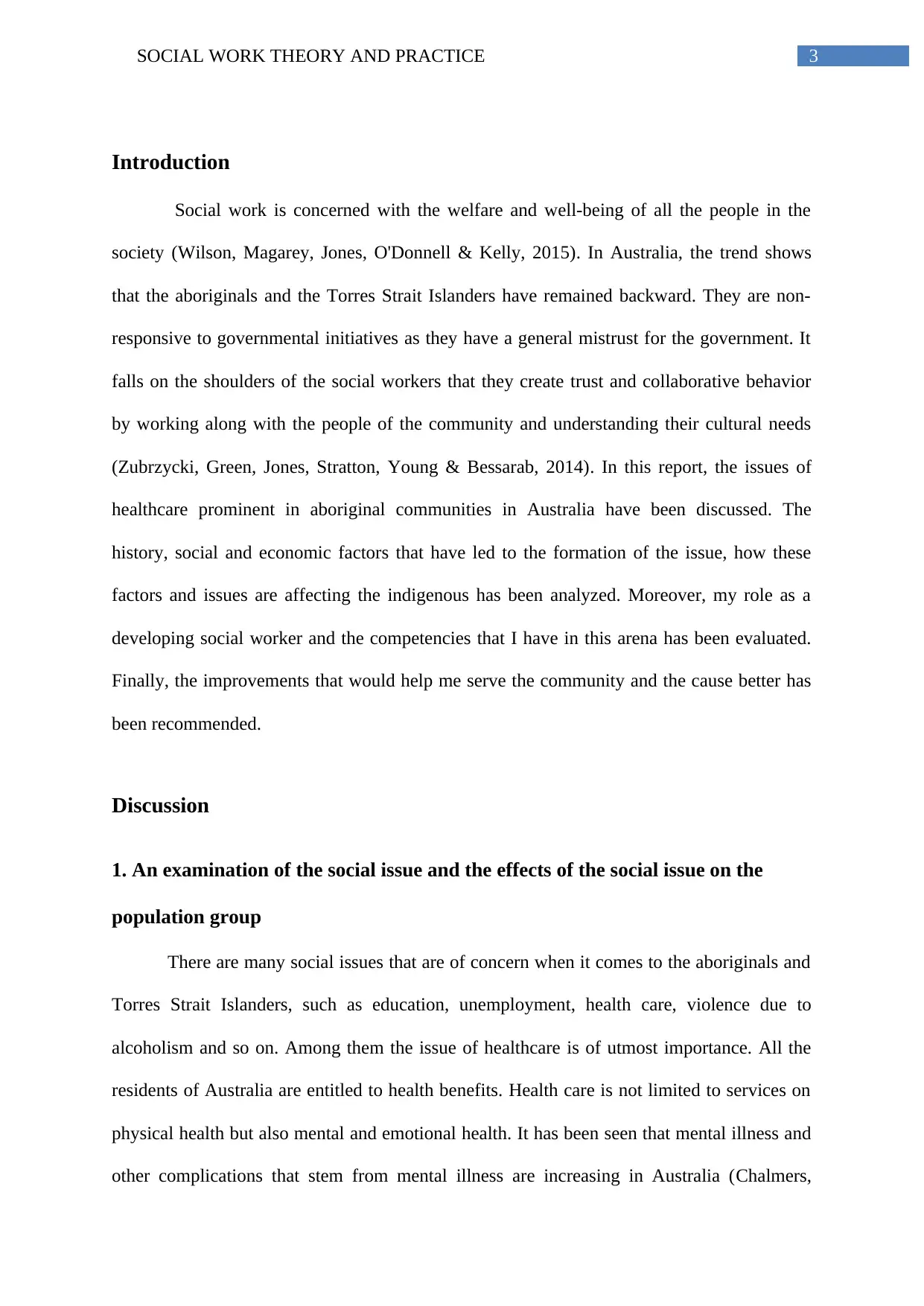
3SOCIAL WORK THEORY AND PRACTICE
Introduction
Social work is concerned with the welfare and well-being of all the people in the
society (Wilson, Magarey, Jones, O'Donnell & Kelly, 2015). In Australia, the trend shows
that the aboriginals and the Torres Strait Islanders have remained backward. They are non-
responsive to governmental initiatives as they have a general mistrust for the government. It
falls on the shoulders of the social workers that they create trust and collaborative behavior
by working along with the people of the community and understanding their cultural needs
(Zubrzycki, Green, Jones, Stratton, Young & Bessarab, 2014). In this report, the issues of
healthcare prominent in aboriginal communities in Australia have been discussed. The
history, social and economic factors that have led to the formation of the issue, how these
factors and issues are affecting the indigenous has been analyzed. Moreover, my role as a
developing social worker and the competencies that I have in this arena has been evaluated.
Finally, the improvements that would help me serve the community and the cause better has
been recommended.
Discussion
1. An examination of the social issue and the effects of the social issue on the
population group
There are many social issues that are of concern when it comes to the aboriginals and
Torres Strait Islanders, such as education, unemployment, health care, violence due to
alcoholism and so on. Among them the issue of healthcare is of utmost importance. All the
residents of Australia are entitled to health benefits. Health care is not limited to services on
physical health but also mental and emotional health. It has been seen that mental illness and
other complications that stem from mental illness are increasing in Australia (Chalmers,
Introduction
Social work is concerned with the welfare and well-being of all the people in the
society (Wilson, Magarey, Jones, O'Donnell & Kelly, 2015). In Australia, the trend shows
that the aboriginals and the Torres Strait Islanders have remained backward. They are non-
responsive to governmental initiatives as they have a general mistrust for the government. It
falls on the shoulders of the social workers that they create trust and collaborative behavior
by working along with the people of the community and understanding their cultural needs
(Zubrzycki, Green, Jones, Stratton, Young & Bessarab, 2014). In this report, the issues of
healthcare prominent in aboriginal communities in Australia have been discussed. The
history, social and economic factors that have led to the formation of the issue, how these
factors and issues are affecting the indigenous has been analyzed. Moreover, my role as a
developing social worker and the competencies that I have in this arena has been evaluated.
Finally, the improvements that would help me serve the community and the cause better has
been recommended.
Discussion
1. An examination of the social issue and the effects of the social issue on the
population group
There are many social issues that are of concern when it comes to the aboriginals and
Torres Strait Islanders, such as education, unemployment, health care, violence due to
alcoholism and so on. Among them the issue of healthcare is of utmost importance. All the
residents of Australia are entitled to health benefits. Health care is not limited to services on
physical health but also mental and emotional health. It has been seen that mental illness and
other complications that stem from mental illness are increasing in Australia (Chalmers,
Paraphrase This Document
Need a fresh take? Get an instant paraphrase of this document with our AI Paraphraser
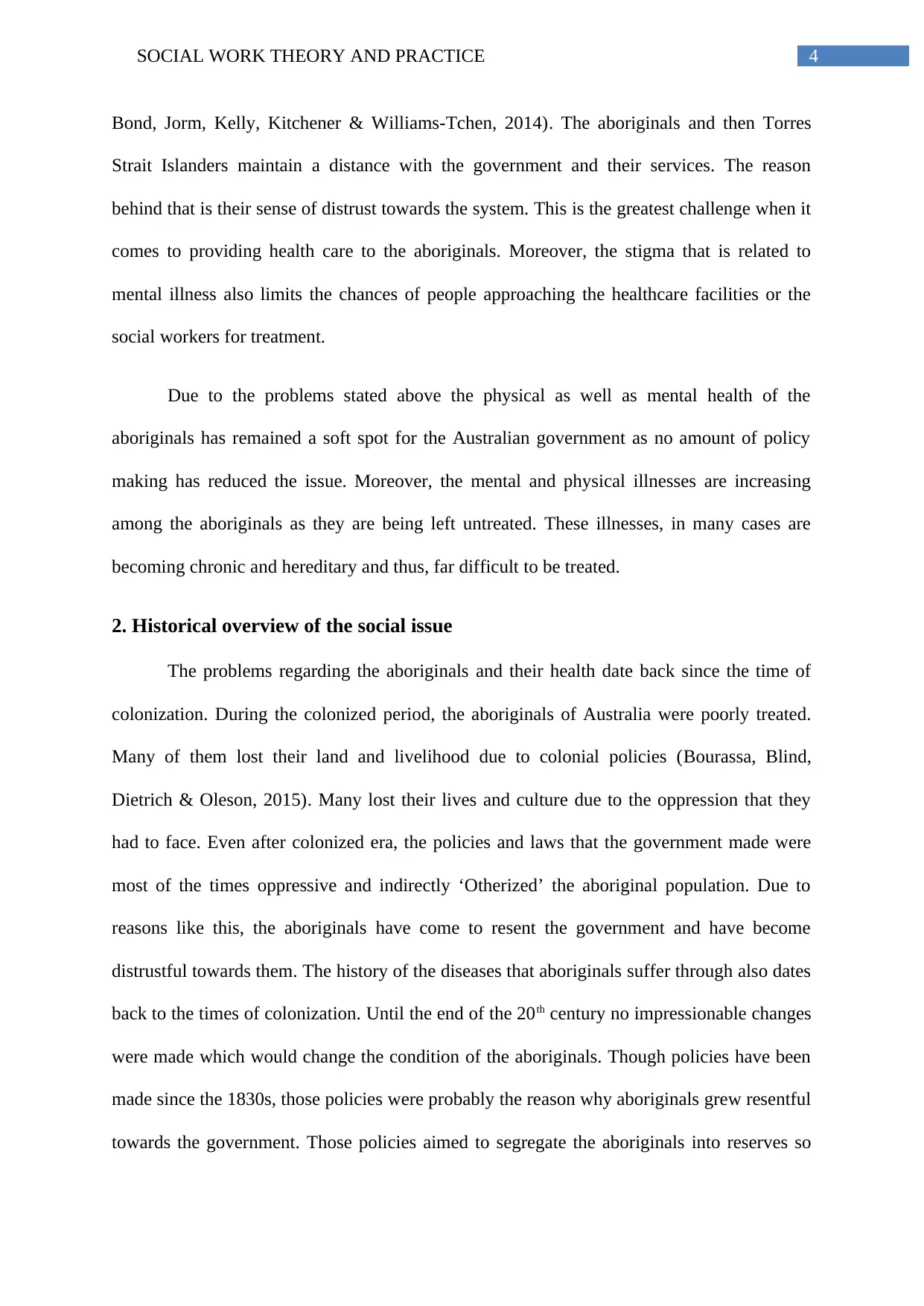
4SOCIAL WORK THEORY AND PRACTICE
Bond, Jorm, Kelly, Kitchener & Williams-Tchen, 2014). The aboriginals and then Torres
Strait Islanders maintain a distance with the government and their services. The reason
behind that is their sense of distrust towards the system. This is the greatest challenge when it
comes to providing health care to the aboriginals. Moreover, the stigma that is related to
mental illness also limits the chances of people approaching the healthcare facilities or the
social workers for treatment.
Due to the problems stated above the physical as well as mental health of the
aboriginals has remained a soft spot for the Australian government as no amount of policy
making has reduced the issue. Moreover, the mental and physical illnesses are increasing
among the aboriginals as they are being left untreated. These illnesses, in many cases are
becoming chronic and hereditary and thus, far difficult to be treated.
2. Historical overview of the social issue
The problems regarding the aboriginals and their health date back since the time of
colonization. During the colonized period, the aboriginals of Australia were poorly treated.
Many of them lost their land and livelihood due to colonial policies (Bourassa, Blind,
Dietrich & Oleson, 2015). Many lost their lives and culture due to the oppression that they
had to face. Even after colonized era, the policies and laws that the government made were
most of the times oppressive and indirectly ‘Otherized’ the aboriginal population. Due to
reasons like this, the aboriginals have come to resent the government and have become
distrustful towards them. The history of the diseases that aboriginals suffer through also dates
back to the times of colonization. Until the end of the 20th century no impressionable changes
were made which would change the condition of the aboriginals. Though policies have been
made since the 1830s, those policies were probably the reason why aboriginals grew resentful
towards the government. Those policies aimed to segregate the aboriginals into reserves so
Bond, Jorm, Kelly, Kitchener & Williams-Tchen, 2014). The aboriginals and then Torres
Strait Islanders maintain a distance with the government and their services. The reason
behind that is their sense of distrust towards the system. This is the greatest challenge when it
comes to providing health care to the aboriginals. Moreover, the stigma that is related to
mental illness also limits the chances of people approaching the healthcare facilities or the
social workers for treatment.
Due to the problems stated above the physical as well as mental health of the
aboriginals has remained a soft spot for the Australian government as no amount of policy
making has reduced the issue. Moreover, the mental and physical illnesses are increasing
among the aboriginals as they are being left untreated. These illnesses, in many cases are
becoming chronic and hereditary and thus, far difficult to be treated.
2. Historical overview of the social issue
The problems regarding the aboriginals and their health date back since the time of
colonization. During the colonized period, the aboriginals of Australia were poorly treated.
Many of them lost their land and livelihood due to colonial policies (Bourassa, Blind,
Dietrich & Oleson, 2015). Many lost their lives and culture due to the oppression that they
had to face. Even after colonized era, the policies and laws that the government made were
most of the times oppressive and indirectly ‘Otherized’ the aboriginal population. Due to
reasons like this, the aboriginals have come to resent the government and have become
distrustful towards them. The history of the diseases that aboriginals suffer through also dates
back to the times of colonization. Until the end of the 20th century no impressionable changes
were made which would change the condition of the aboriginals. Though policies have been
made since the 1830s, those policies were probably the reason why aboriginals grew resentful
towards the government. Those policies aimed to segregate the aboriginals into reserves so
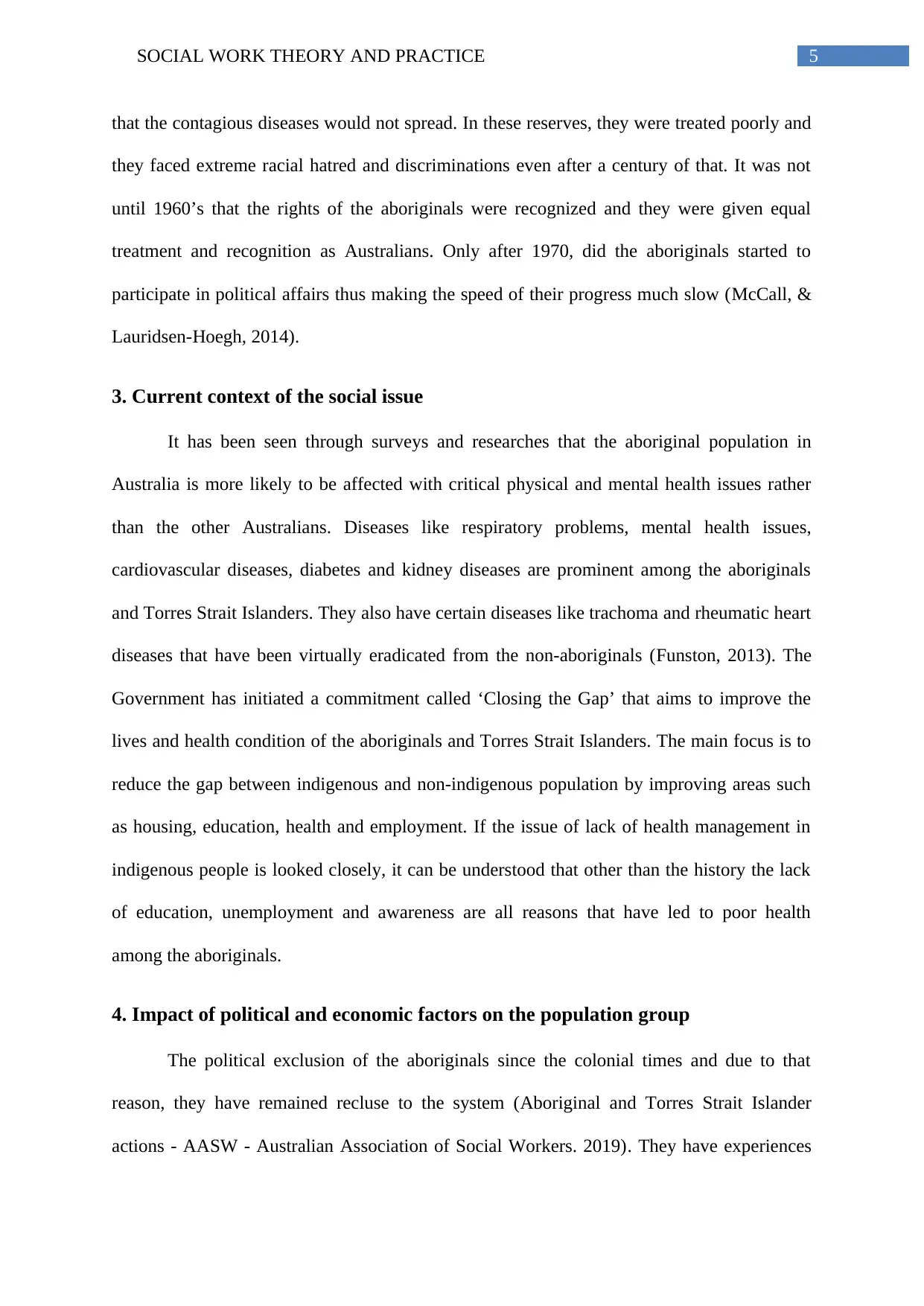
5SOCIAL WORK THEORY AND PRACTICE
that the contagious diseases would not spread. In these reserves, they were treated poorly and
they faced extreme racial hatred and discriminations even after a century of that. It was not
until 1960’s that the rights of the aboriginals were recognized and they were given equal
treatment and recognition as Australians. Only after 1970, did the aboriginals started to
participate in political affairs thus making the speed of their progress much slow (McCall, &
Lauridsen-Hoegh, 2014).
3. Current context of the social issue
It has been seen through surveys and researches that the aboriginal population in
Australia is more likely to be affected with critical physical and mental health issues rather
than the other Australians. Diseases like respiratory problems, mental health issues,
cardiovascular diseases, diabetes and kidney diseases are prominent among the aboriginals
and Torres Strait Islanders. They also have certain diseases like trachoma and rheumatic heart
diseases that have been virtually eradicated from the non-aboriginals (Funston, 2013). The
Government has initiated a commitment called ‘Closing the Gap’ that aims to improve the
lives and health condition of the aboriginals and Torres Strait Islanders. The main focus is to
reduce the gap between indigenous and non-indigenous population by improving areas such
as housing, education, health and employment. If the issue of lack of health management in
indigenous people is looked closely, it can be understood that other than the history the lack
of education, unemployment and awareness are all reasons that have led to poor health
among the aboriginals.
4. Impact of political and economic factors on the population group
The political exclusion of the aboriginals since the colonial times and due to that
reason, they have remained recluse to the system (Aboriginal and Torres Strait Islander
actions - AASW - Australian Association of Social Workers. 2019). They have experiences
that the contagious diseases would not spread. In these reserves, they were treated poorly and
they faced extreme racial hatred and discriminations even after a century of that. It was not
until 1960’s that the rights of the aboriginals were recognized and they were given equal
treatment and recognition as Australians. Only after 1970, did the aboriginals started to
participate in political affairs thus making the speed of their progress much slow (McCall, &
Lauridsen-Hoegh, 2014).
3. Current context of the social issue
It has been seen through surveys and researches that the aboriginal population in
Australia is more likely to be affected with critical physical and mental health issues rather
than the other Australians. Diseases like respiratory problems, mental health issues,
cardiovascular diseases, diabetes and kidney diseases are prominent among the aboriginals
and Torres Strait Islanders. They also have certain diseases like trachoma and rheumatic heart
diseases that have been virtually eradicated from the non-aboriginals (Funston, 2013). The
Government has initiated a commitment called ‘Closing the Gap’ that aims to improve the
lives and health condition of the aboriginals and Torres Strait Islanders. The main focus is to
reduce the gap between indigenous and non-indigenous population by improving areas such
as housing, education, health and employment. If the issue of lack of health management in
indigenous people is looked closely, it can be understood that other than the history the lack
of education, unemployment and awareness are all reasons that have led to poor health
among the aboriginals.
4. Impact of political and economic factors on the population group
The political exclusion of the aboriginals since the colonial times and due to that
reason, they have remained recluse to the system (Aboriginal and Torres Strait Islander
actions - AASW - Australian Association of Social Workers. 2019). They have experiences
⊘ This is a preview!⊘
Do you want full access?
Subscribe today to unlock all pages.

Trusted by 1+ million students worldwide
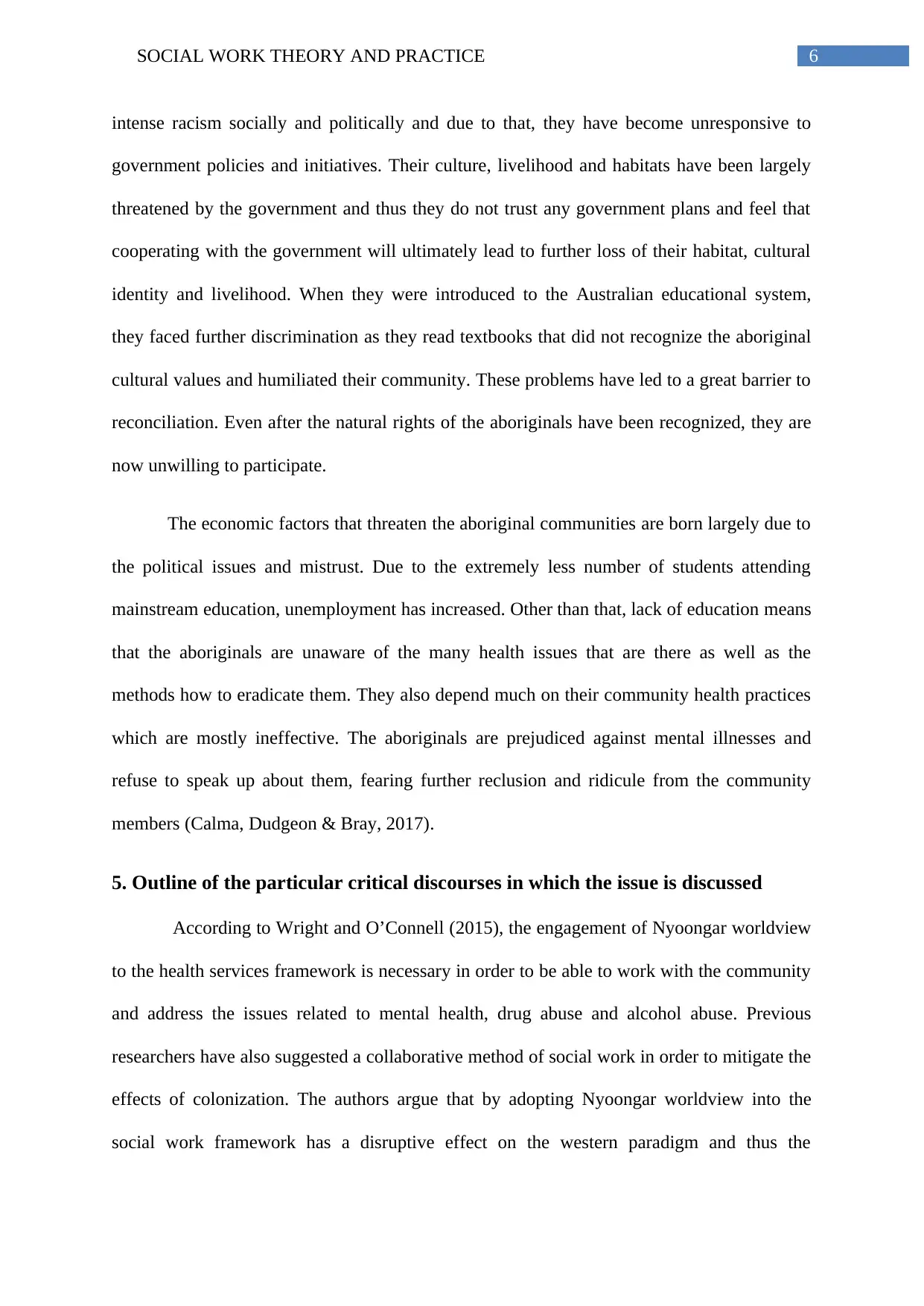
6SOCIAL WORK THEORY AND PRACTICE
intense racism socially and politically and due to that, they have become unresponsive to
government policies and initiatives. Their culture, livelihood and habitats have been largely
threatened by the government and thus they do not trust any government plans and feel that
cooperating with the government will ultimately lead to further loss of their habitat, cultural
identity and livelihood. When they were introduced to the Australian educational system,
they faced further discrimination as they read textbooks that did not recognize the aboriginal
cultural values and humiliated their community. These problems have led to a great barrier to
reconciliation. Even after the natural rights of the aboriginals have been recognized, they are
now unwilling to participate.
The economic factors that threaten the aboriginal communities are born largely due to
the political issues and mistrust. Due to the extremely less number of students attending
mainstream education, unemployment has increased. Other than that, lack of education means
that the aboriginals are unaware of the many health issues that are there as well as the
methods how to eradicate them. They also depend much on their community health practices
which are mostly ineffective. The aboriginals are prejudiced against mental illnesses and
refuse to speak up about them, fearing further reclusion and ridicule from the community
members (Calma, Dudgeon & Bray, 2017).
5. Outline of the particular critical discourses in which the issue is discussed
According to Wright and O’Connell (2015), the engagement of Nyoongar worldview
to the health services framework is necessary in order to be able to work with the community
and address the issues related to mental health, drug abuse and alcohol abuse. Previous
researchers have also suggested a collaborative method of social work in order to mitigate the
effects of colonization. The authors argue that by adopting Nyoongar worldview into the
social work framework has a disruptive effect on the western paradigm and thus the
intense racism socially and politically and due to that, they have become unresponsive to
government policies and initiatives. Their culture, livelihood and habitats have been largely
threatened by the government and thus they do not trust any government plans and feel that
cooperating with the government will ultimately lead to further loss of their habitat, cultural
identity and livelihood. When they were introduced to the Australian educational system,
they faced further discrimination as they read textbooks that did not recognize the aboriginal
cultural values and humiliated their community. These problems have led to a great barrier to
reconciliation. Even after the natural rights of the aboriginals have been recognized, they are
now unwilling to participate.
The economic factors that threaten the aboriginal communities are born largely due to
the political issues and mistrust. Due to the extremely less number of students attending
mainstream education, unemployment has increased. Other than that, lack of education means
that the aboriginals are unaware of the many health issues that are there as well as the
methods how to eradicate them. They also depend much on their community health practices
which are mostly ineffective. The aboriginals are prejudiced against mental illnesses and
refuse to speak up about them, fearing further reclusion and ridicule from the community
members (Calma, Dudgeon & Bray, 2017).
5. Outline of the particular critical discourses in which the issue is discussed
According to Wright and O’Connell (2015), the engagement of Nyoongar worldview
to the health services framework is necessary in order to be able to work with the community
and address the issues related to mental health, drug abuse and alcohol abuse. Previous
researchers have also suggested a collaborative method of social work in order to mitigate the
effects of colonization. The authors argue that by adopting Nyoongar worldview into the
social work framework has a disruptive effect on the western paradigm and thus the
Paraphrase This Document
Need a fresh take? Get an instant paraphrase of this document with our AI Paraphraser
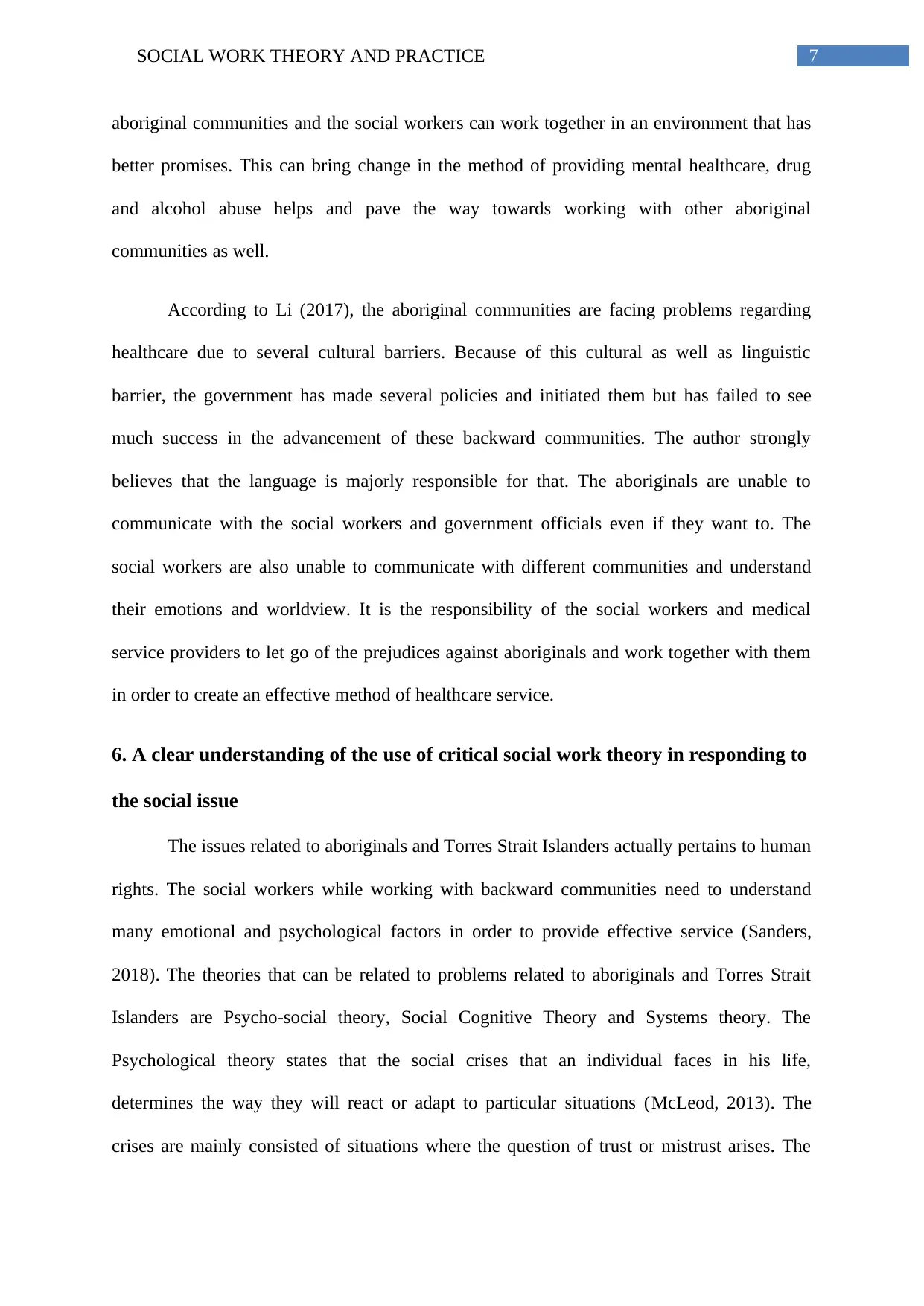
7SOCIAL WORK THEORY AND PRACTICE
aboriginal communities and the social workers can work together in an environment that has
better promises. This can bring change in the method of providing mental healthcare, drug
and alcohol abuse helps and pave the way towards working with other aboriginal
communities as well.
According to Li (2017), the aboriginal communities are facing problems regarding
healthcare due to several cultural barriers. Because of this cultural as well as linguistic
barrier, the government has made several policies and initiated them but has failed to see
much success in the advancement of these backward communities. The author strongly
believes that the language is majorly responsible for that. The aboriginals are unable to
communicate with the social workers and government officials even if they want to. The
social workers are also unable to communicate with different communities and understand
their emotions and worldview. It is the responsibility of the social workers and medical
service providers to let go of the prejudices against aboriginals and work together with them
in order to create an effective method of healthcare service.
6. A clear understanding of the use of critical social work theory in responding to
the social issue
The issues related to aboriginals and Torres Strait Islanders actually pertains to human
rights. The social workers while working with backward communities need to understand
many emotional and psychological factors in order to provide effective service (Sanders,
2018). The theories that can be related to problems related to aboriginals and Torres Strait
Islanders are Psycho-social theory, Social Cognitive Theory and Systems theory. The
Psychological theory states that the social crises that an individual faces in his life,
determines the way they will react or adapt to particular situations (McLeod, 2013). The
crises are mainly consisted of situations where the question of trust or mistrust arises. The
aboriginal communities and the social workers can work together in an environment that has
better promises. This can bring change in the method of providing mental healthcare, drug
and alcohol abuse helps and pave the way towards working with other aboriginal
communities as well.
According to Li (2017), the aboriginal communities are facing problems regarding
healthcare due to several cultural barriers. Because of this cultural as well as linguistic
barrier, the government has made several policies and initiated them but has failed to see
much success in the advancement of these backward communities. The author strongly
believes that the language is majorly responsible for that. The aboriginals are unable to
communicate with the social workers and government officials even if they want to. The
social workers are also unable to communicate with different communities and understand
their emotions and worldview. It is the responsibility of the social workers and medical
service providers to let go of the prejudices against aboriginals and work together with them
in order to create an effective method of healthcare service.
6. A clear understanding of the use of critical social work theory in responding to
the social issue
The issues related to aboriginals and Torres Strait Islanders actually pertains to human
rights. The social workers while working with backward communities need to understand
many emotional and psychological factors in order to provide effective service (Sanders,
2018). The theories that can be related to problems related to aboriginals and Torres Strait
Islanders are Psycho-social theory, Social Cognitive Theory and Systems theory. The
Psychological theory states that the social crises that an individual faces in his life,
determines the way they will react or adapt to particular situations (McLeod, 2013). The
crises are mainly consisted of situations where the question of trust or mistrust arises. The
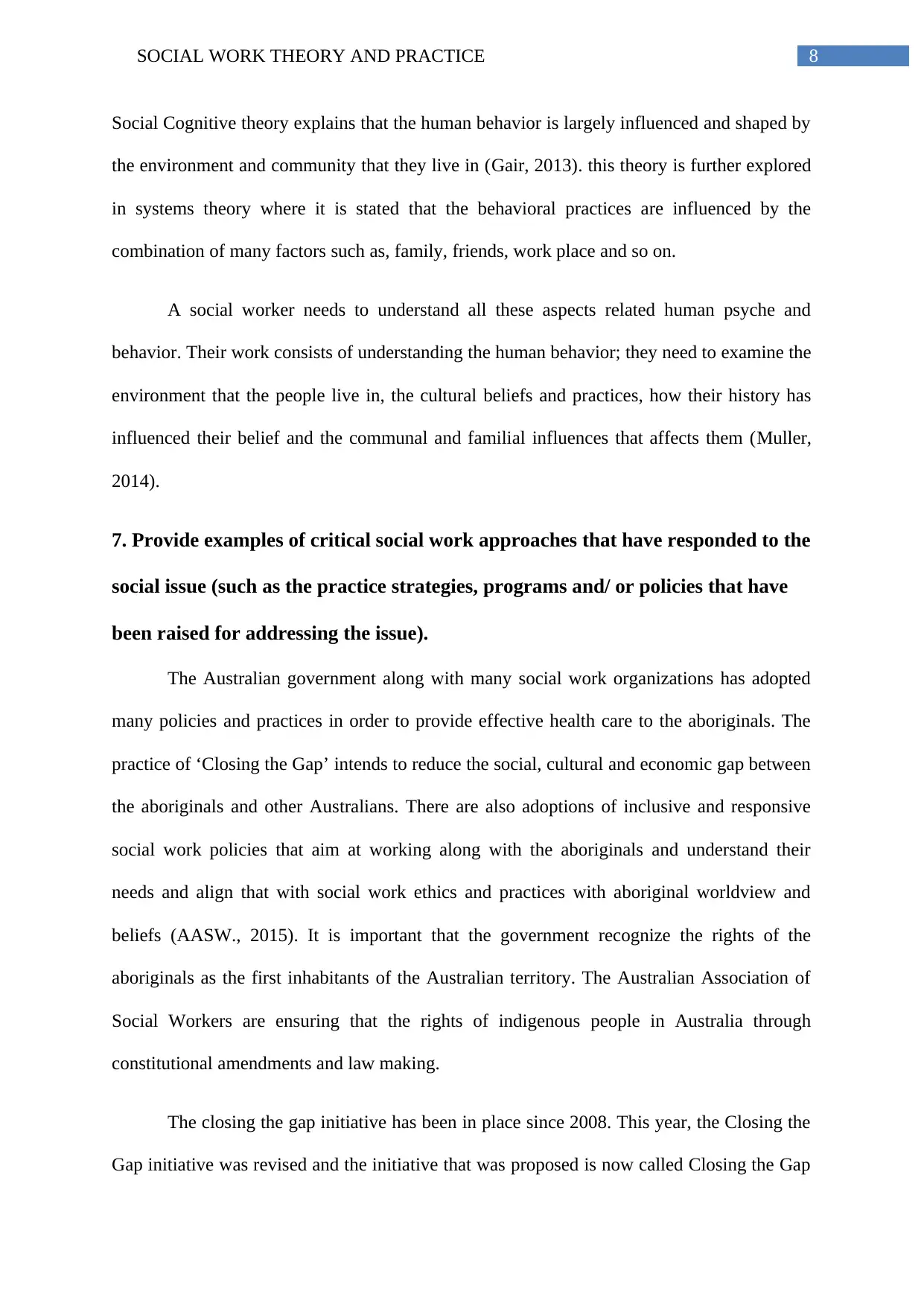
8SOCIAL WORK THEORY AND PRACTICE
Social Cognitive theory explains that the human behavior is largely influenced and shaped by
the environment and community that they live in (Gair, 2013). this theory is further explored
in systems theory where it is stated that the behavioral practices are influenced by the
combination of many factors such as, family, friends, work place and so on.
A social worker needs to understand all these aspects related human psyche and
behavior. Their work consists of understanding the human behavior; they need to examine the
environment that the people live in, the cultural beliefs and practices, how their history has
influenced their belief and the communal and familial influences that affects them (Muller,
2014).
7. Provide examples of critical social work approaches that have responded to the
social issue (such as the practice strategies, programs and/ or policies that have
been raised for addressing the issue).
The Australian government along with many social work organizations has adopted
many policies and practices in order to provide effective health care to the aboriginals. The
practice of ‘Closing the Gap’ intends to reduce the social, cultural and economic gap between
the aboriginals and other Australians. There are also adoptions of inclusive and responsive
social work policies that aim at working along with the aboriginals and understand their
needs and align that with social work ethics and practices with aboriginal worldview and
beliefs (AASW., 2015). It is important that the government recognize the rights of the
aboriginals as the first inhabitants of the Australian territory. The Australian Association of
Social Workers are ensuring that the rights of indigenous people in Australia through
constitutional amendments and law making.
The closing the gap initiative has been in place since 2008. This year, the Closing the
Gap initiative was revised and the initiative that was proposed is now called Closing the Gap
Social Cognitive theory explains that the human behavior is largely influenced and shaped by
the environment and community that they live in (Gair, 2013). this theory is further explored
in systems theory where it is stated that the behavioral practices are influenced by the
combination of many factors such as, family, friends, work place and so on.
A social worker needs to understand all these aspects related human psyche and
behavior. Their work consists of understanding the human behavior; they need to examine the
environment that the people live in, the cultural beliefs and practices, how their history has
influenced their belief and the communal and familial influences that affects them (Muller,
2014).
7. Provide examples of critical social work approaches that have responded to the
social issue (such as the practice strategies, programs and/ or policies that have
been raised for addressing the issue).
The Australian government along with many social work organizations has adopted
many policies and practices in order to provide effective health care to the aboriginals. The
practice of ‘Closing the Gap’ intends to reduce the social, cultural and economic gap between
the aboriginals and other Australians. There are also adoptions of inclusive and responsive
social work policies that aim at working along with the aboriginals and understand their
needs and align that with social work ethics and practices with aboriginal worldview and
beliefs (AASW., 2015). It is important that the government recognize the rights of the
aboriginals as the first inhabitants of the Australian territory. The Australian Association of
Social Workers are ensuring that the rights of indigenous people in Australia through
constitutional amendments and law making.
The closing the gap initiative has been in place since 2008. This year, the Closing the
Gap initiative was revised and the initiative that was proposed is now called Closing the Gap
⊘ This is a preview!⊘
Do you want full access?
Subscribe today to unlock all pages.

Trusted by 1+ million students worldwide
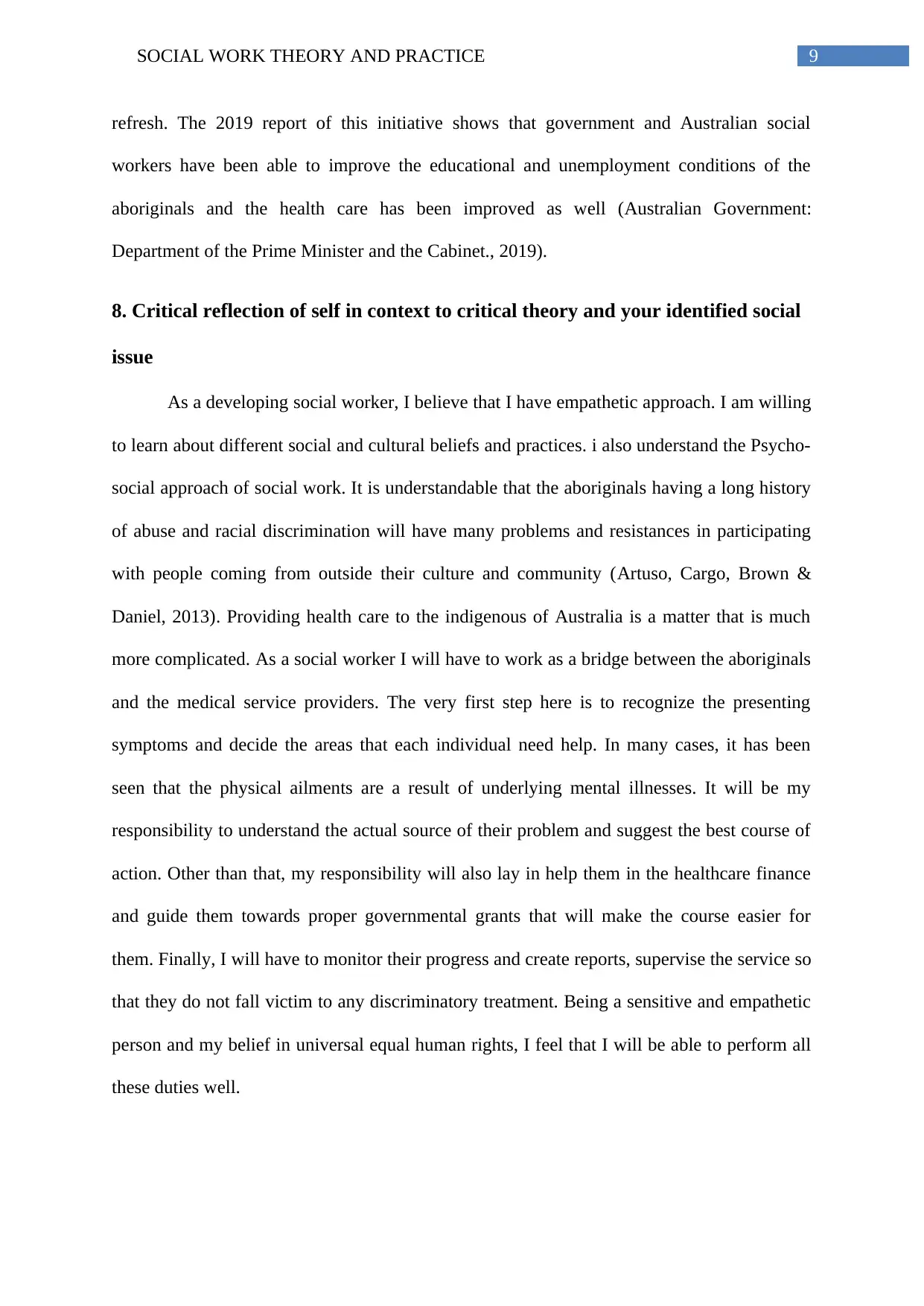
9SOCIAL WORK THEORY AND PRACTICE
refresh. The 2019 report of this initiative shows that government and Australian social
workers have been able to improve the educational and unemployment conditions of the
aboriginals and the health care has been improved as well (Australian Government:
Department of the Prime Minister and the Cabinet., 2019).
8. Critical reflection of self in context to critical theory and your identified social
issue
As a developing social worker, I believe that I have empathetic approach. I am willing
to learn about different social and cultural beliefs and practices. i also understand the Psycho-
social approach of social work. It is understandable that the aboriginals having a long history
of abuse and racial discrimination will have many problems and resistances in participating
with people coming from outside their culture and community (Artuso, Cargo, Brown &
Daniel, 2013). Providing health care to the indigenous of Australia is a matter that is much
more complicated. As a social worker I will have to work as a bridge between the aboriginals
and the medical service providers. The very first step here is to recognize the presenting
symptoms and decide the areas that each individual need help. In many cases, it has been
seen that the physical ailments are a result of underlying mental illnesses. It will be my
responsibility to understand the actual source of their problem and suggest the best course of
action. Other than that, my responsibility will also lay in help them in the healthcare finance
and guide them towards proper governmental grants that will make the course easier for
them. Finally, I will have to monitor their progress and create reports, supervise the service so
that they do not fall victim to any discriminatory treatment. Being a sensitive and empathetic
person and my belief in universal equal human rights, I feel that I will be able to perform all
these duties well.
refresh. The 2019 report of this initiative shows that government and Australian social
workers have been able to improve the educational and unemployment conditions of the
aboriginals and the health care has been improved as well (Australian Government:
Department of the Prime Minister and the Cabinet., 2019).
8. Critical reflection of self in context to critical theory and your identified social
issue
As a developing social worker, I believe that I have empathetic approach. I am willing
to learn about different social and cultural beliefs and practices. i also understand the Psycho-
social approach of social work. It is understandable that the aboriginals having a long history
of abuse and racial discrimination will have many problems and resistances in participating
with people coming from outside their culture and community (Artuso, Cargo, Brown &
Daniel, 2013). Providing health care to the indigenous of Australia is a matter that is much
more complicated. As a social worker I will have to work as a bridge between the aboriginals
and the medical service providers. The very first step here is to recognize the presenting
symptoms and decide the areas that each individual need help. In many cases, it has been
seen that the physical ailments are a result of underlying mental illnesses. It will be my
responsibility to understand the actual source of their problem and suggest the best course of
action. Other than that, my responsibility will also lay in help them in the healthcare finance
and guide them towards proper governmental grants that will make the course easier for
them. Finally, I will have to monitor their progress and create reports, supervise the service so
that they do not fall victim to any discriminatory treatment. Being a sensitive and empathetic
person and my belief in universal equal human rights, I feel that I will be able to perform all
these duties well.
Paraphrase This Document
Need a fresh take? Get an instant paraphrase of this document with our AI Paraphraser
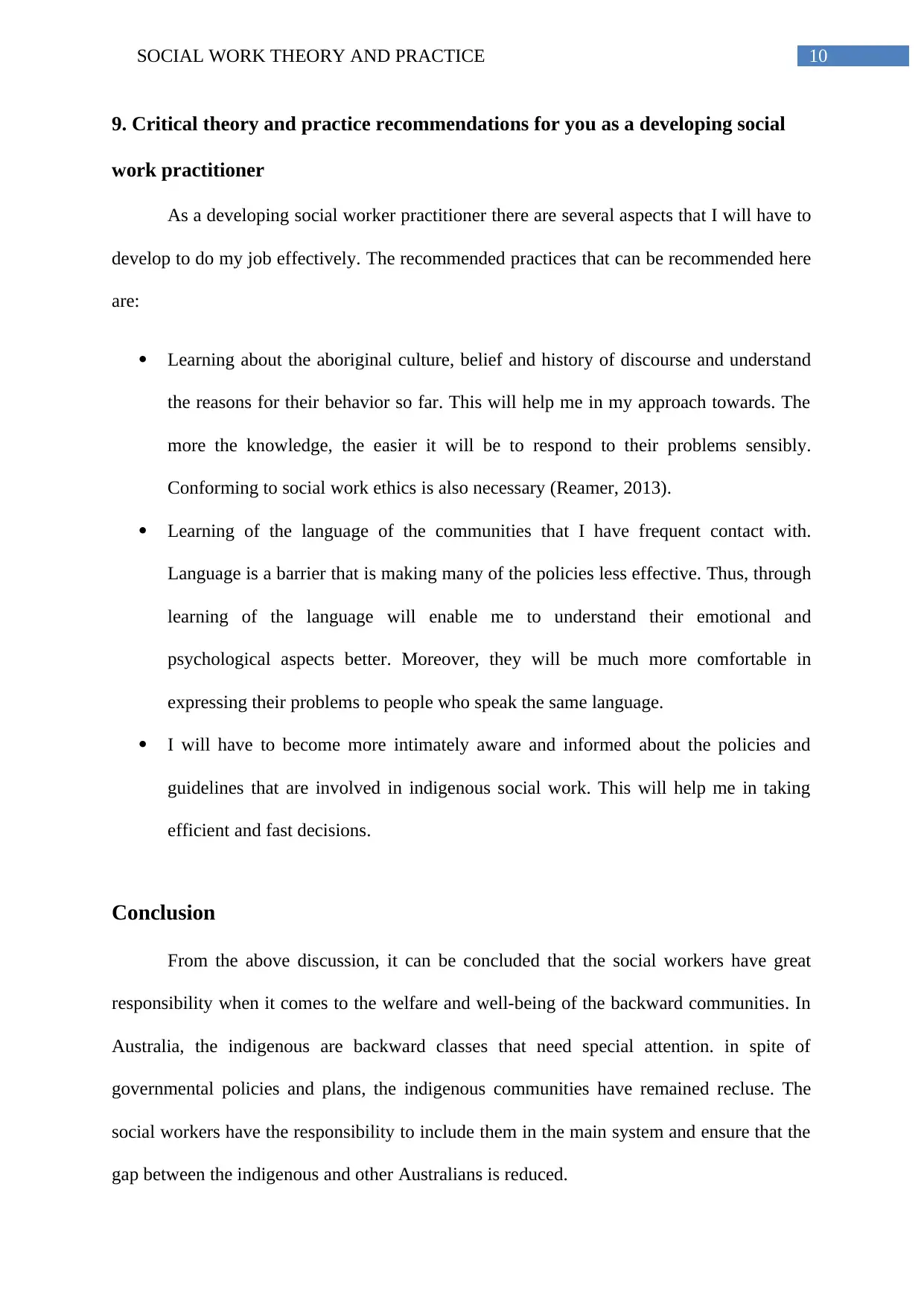
10SOCIAL WORK THEORY AND PRACTICE
9. Critical theory and practice recommendations for you as a developing social
work practitioner
As a developing social worker practitioner there are several aspects that I will have to
develop to do my job effectively. The recommended practices that can be recommended here
are:
Learning about the aboriginal culture, belief and history of discourse and understand
the reasons for their behavior so far. This will help me in my approach towards. The
more the knowledge, the easier it will be to respond to their problems sensibly.
Conforming to social work ethics is also necessary (Reamer, 2013).
Learning of the language of the communities that I have frequent contact with.
Language is a barrier that is making many of the policies less effective. Thus, through
learning of the language will enable me to understand their emotional and
psychological aspects better. Moreover, they will be much more comfortable in
expressing their problems to people who speak the same language.
I will have to become more intimately aware and informed about the policies and
guidelines that are involved in indigenous social work. This will help me in taking
efficient and fast decisions.
Conclusion
From the above discussion, it can be concluded that the social workers have great
responsibility when it comes to the welfare and well-being of the backward communities. In
Australia, the indigenous are backward classes that need special attention. in spite of
governmental policies and plans, the indigenous communities have remained recluse. The
social workers have the responsibility to include them in the main system and ensure that the
gap between the indigenous and other Australians is reduced.
9. Critical theory and practice recommendations for you as a developing social
work practitioner
As a developing social worker practitioner there are several aspects that I will have to
develop to do my job effectively. The recommended practices that can be recommended here
are:
Learning about the aboriginal culture, belief and history of discourse and understand
the reasons for their behavior so far. This will help me in my approach towards. The
more the knowledge, the easier it will be to respond to their problems sensibly.
Conforming to social work ethics is also necessary (Reamer, 2013).
Learning of the language of the communities that I have frequent contact with.
Language is a barrier that is making many of the policies less effective. Thus, through
learning of the language will enable me to understand their emotional and
psychological aspects better. Moreover, they will be much more comfortable in
expressing their problems to people who speak the same language.
I will have to become more intimately aware and informed about the policies and
guidelines that are involved in indigenous social work. This will help me in taking
efficient and fast decisions.
Conclusion
From the above discussion, it can be concluded that the social workers have great
responsibility when it comes to the welfare and well-being of the backward communities. In
Australia, the indigenous are backward classes that need special attention. in spite of
governmental policies and plans, the indigenous communities have remained recluse. The
social workers have the responsibility to include them in the main system and ensure that the
gap between the indigenous and other Australians is reduced.
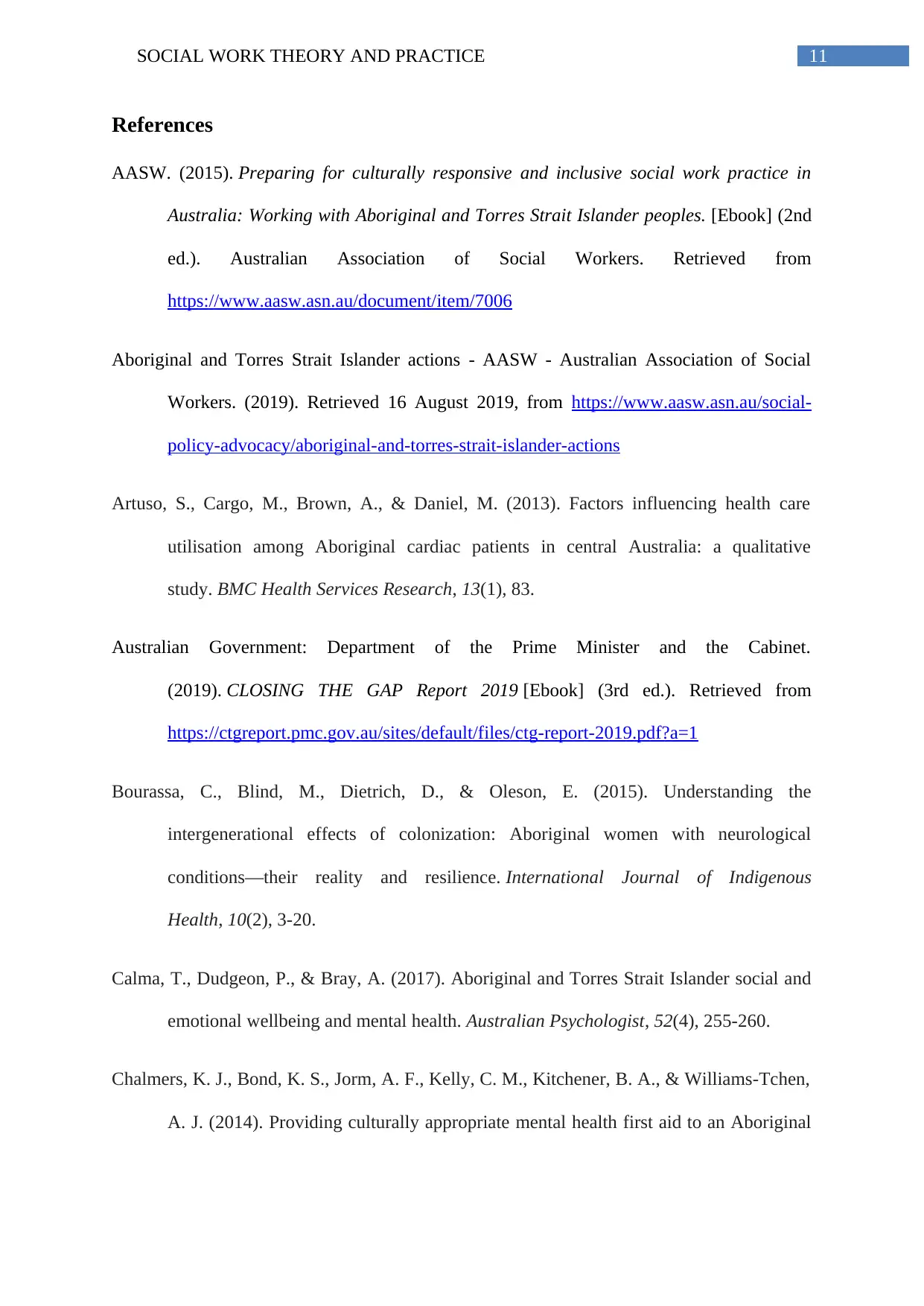
11SOCIAL WORK THEORY AND PRACTICE
References
AASW. (2015). Preparing for culturally responsive and inclusive social work practice in
Australia: Working with Aboriginal and Torres Strait Islander peoples. [Ebook] (2nd
ed.). Australian Association of Social Workers. Retrieved from
https://www.aasw.asn.au/document/item/7006
Aboriginal and Torres Strait Islander actions - AASW - Australian Association of Social
Workers. (2019). Retrieved 16 August 2019, from https://www.aasw.asn.au/social-
policy-advocacy/aboriginal-and-torres-strait-islander-actions
Artuso, S., Cargo, M., Brown, A., & Daniel, M. (2013). Factors influencing health care
utilisation among Aboriginal cardiac patients in central Australia: a qualitative
study. BMC Health Services Research, 13(1), 83.
Australian Government: Department of the Prime Minister and the Cabinet.
(2019). CLOSING THE GAP Report 2019 [Ebook] (3rd ed.). Retrieved from
https://ctgreport.pmc.gov.au/sites/default/files/ctg-report-2019.pdf?a=1
Bourassa, C., Blind, M., Dietrich, D., & Oleson, E. (2015). Understanding the
intergenerational effects of colonization: Aboriginal women with neurological
conditions—their reality and resilience. International Journal of Indigenous
Health, 10(2), 3-20.
Calma, T., Dudgeon, P., & Bray, A. (2017). Aboriginal and Torres Strait Islander social and
emotional wellbeing and mental health. Australian Psychologist, 52(4), 255-260.
Chalmers, K. J., Bond, K. S., Jorm, A. F., Kelly, C. M., Kitchener, B. A., & Williams-Tchen,
A. J. (2014). Providing culturally appropriate mental health first aid to an Aboriginal
References
AASW. (2015). Preparing for culturally responsive and inclusive social work practice in
Australia: Working with Aboriginal and Torres Strait Islander peoples. [Ebook] (2nd
ed.). Australian Association of Social Workers. Retrieved from
https://www.aasw.asn.au/document/item/7006
Aboriginal and Torres Strait Islander actions - AASW - Australian Association of Social
Workers. (2019). Retrieved 16 August 2019, from https://www.aasw.asn.au/social-
policy-advocacy/aboriginal-and-torres-strait-islander-actions
Artuso, S., Cargo, M., Brown, A., & Daniel, M. (2013). Factors influencing health care
utilisation among Aboriginal cardiac patients in central Australia: a qualitative
study. BMC Health Services Research, 13(1), 83.
Australian Government: Department of the Prime Minister and the Cabinet.
(2019). CLOSING THE GAP Report 2019 [Ebook] (3rd ed.). Retrieved from
https://ctgreport.pmc.gov.au/sites/default/files/ctg-report-2019.pdf?a=1
Bourassa, C., Blind, M., Dietrich, D., & Oleson, E. (2015). Understanding the
intergenerational effects of colonization: Aboriginal women with neurological
conditions—their reality and resilience. International Journal of Indigenous
Health, 10(2), 3-20.
Calma, T., Dudgeon, P., & Bray, A. (2017). Aboriginal and Torres Strait Islander social and
emotional wellbeing and mental health. Australian Psychologist, 52(4), 255-260.
Chalmers, K. J., Bond, K. S., Jorm, A. F., Kelly, C. M., Kitchener, B. A., & Williams-Tchen,
A. J. (2014). Providing culturally appropriate mental health first aid to an Aboriginal
⊘ This is a preview!⊘
Do you want full access?
Subscribe today to unlock all pages.

Trusted by 1+ million students worldwide
1 out of 14
Related Documents
Your All-in-One AI-Powered Toolkit for Academic Success.
+13062052269
info@desklib.com
Available 24*7 on WhatsApp / Email
![[object Object]](/_next/static/media/star-bottom.7253800d.svg)
Unlock your academic potential
Copyright © 2020–2025 A2Z Services. All Rights Reserved. Developed and managed by ZUCOL.





